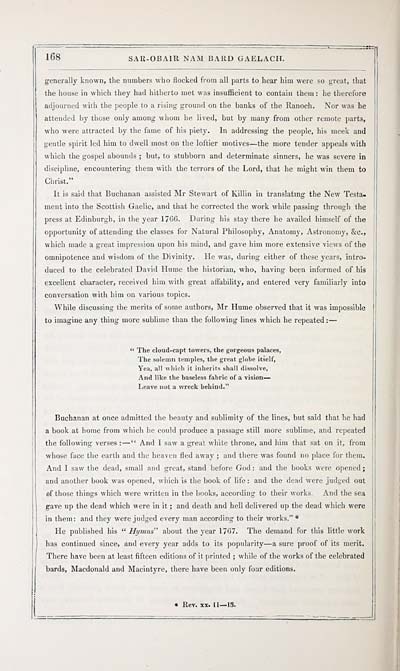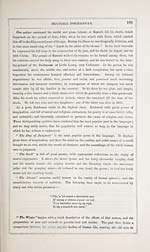Blair Collection > Sar-obair nam bard gaelach, or, The beauties of Gaelic poetry, and lives of the Highland bards
(244)
Download files
Complete book:
Individual page:
Thumbnail gallery: Grid view | List view

168 SAR-OBAIR NAM CARD GAELACH.
generally known, the numbers who flocked from all parts to hear him were so great, that
the house in which they had hitherto met was insufficient to contain them : he therefore
adjourned with the people to a rising ground on the banks of the Ranoch. Nor was he
attended by those only among whom he lived, but by many from other remote parts,
who were attracted by the fame of his piety. In addressing the people, his meek and
gentle s])irit led him to dwell most on the loftier motives — the more tender appeals with
which the gospel abounds ; but, to stubborn and determinate sinners, he was severe in
discipline, encountering them with the terrors of the Lord, that he might win them to
Christ."
It is said that Buchanan assisted Mr Stewart of Killin in translating the New Testa-
ment into the Scottish Gaelic, and that he corrected the work while passing through the
press at Edinburgh, in the year 1766. During his stay there he availed himself of the
opportunity of attending the classes for Natural Philosophy, Anatomy, Astronomy, &c.,
which made a great impression upon his mind, and gave him more extensive views of the
omnipotence and wisdom of the Divinity. He was, during either of these years, intro-
duced to the celebrated David Hume the historian, who, having been informed of his
excellent character, received him with great affability, and entered very faniiliaily into
conversation with him on various topics.
While discussing tiie merits of some authors, Mr Hume observed that it was impossible
to imagine any thing more sublime than the following lines which he repeated : —
' The cloud-capt towers, the gorgeous palaces,
The solemn temples, the great globe itself,
Yea, all whinh it inherits shall ilissolve.
And like the baseless fabric of a vision —
Leave not a wreck behind."
Buchanan at once admitted the beauty and sublimity of the lines, but said that he had
a book at home from which he could produce a passage still more sublime, and repeated
the following verses : — '* And I saw a great white throne, and him that sat on it, from
wliose face the earth and the heaven fled away ; and there was found no place for them.
And I saw the dead, small and great, stand before God: and the books were opened;
and another book was opened, which is the book of life: and the dead were judged out
of those things which were written in the books, according to their works And the sea
gave up the dead which were in it ; and death and hell delivered up the dead which were
in them: and they were judged every man according to their works." *
He published his " Hymns" about the year 1767. The demand for this little work
has continued since, and every year adds to its popularity — a sure proof of its merit.
There have been at least fifteen editions of it printed ; while of the works of the celebrated
bards, Macdonald and Macintyre, there have been only four editions.
• Rev. XX. 11—13.
generally known, the numbers who flocked from all parts to hear him were so great, that
the house in which they had hitherto met was insufficient to contain them : he therefore
adjourned with the people to a rising ground on the banks of the Ranoch. Nor was he
attended by those only among whom he lived, but by many from other remote parts,
who were attracted by the fame of his piety. In addressing the people, his meek and
gentle s])irit led him to dwell most on the loftier motives — the more tender appeals with
which the gospel abounds ; but, to stubborn and determinate sinners, he was severe in
discipline, encountering them with the terrors of the Lord, that he might win them to
Christ."
It is said that Buchanan assisted Mr Stewart of Killin in translating the New Testa-
ment into the Scottish Gaelic, and that he corrected the work while passing through the
press at Edinburgh, in the year 1766. During his stay there he availed himself of the
opportunity of attending the classes for Natural Philosophy, Anatomy, Astronomy, &c.,
which made a great impression upon his mind, and gave him more extensive views of the
omnipotence and wisdom of the Divinity. He was, during either of these years, intro-
duced to the celebrated David Hume the historian, who, having been informed of his
excellent character, received him with great affability, and entered very faniiliaily into
conversation with him on various topics.
While discussing tiie merits of some authors, Mr Hume observed that it was impossible
to imagine any thing more sublime than the following lines which he repeated : —
' The cloud-capt towers, the gorgeous palaces,
The solemn temples, the great globe itself,
Yea, all whinh it inherits shall ilissolve.
And like the baseless fabric of a vision —
Leave not a wreck behind."
Buchanan at once admitted the beauty and sublimity of the lines, but said that he had
a book at home from which he could produce a passage still more sublime, and repeated
the following verses : — '* And I saw a great white throne, and him that sat on it, from
wliose face the earth and the heaven fled away ; and there was found no place for them.
And I saw the dead, small and great, stand before God: and the books were opened;
and another book was opened, which is the book of life: and the dead were judged out
of those things which were written in the books, according to their works And the sea
gave up the dead which were in it ; and death and hell delivered up the dead which were
in them: and they were judged every man according to their works." *
He published his " Hymns" about the year 1767. The demand for this little work
has continued since, and every year adds to its popularity — a sure proof of its merit.
There have been at least fifteen editions of it printed ; while of the works of the celebrated
bards, Macdonald and Macintyre, there have been only four editions.
• Rev. XX. 11—13.
Set display mode to: Large image | Transcription
Images and transcriptions on this page, including medium image downloads, may be used under the Creative Commons Attribution 4.0 International Licence unless otherwise stated. ![]()
| Early Gaelic Book Collections > Blair Collection > Sar-obair nam bard gaelach, or, The beauties of Gaelic poetry, and lives of the Highland bards > (244) |
|---|
| Permanent URL | https://digital.nls.uk/81870796 |
|---|
| Description | A selection of books from a collection of more than 500 titles, mostly on religious and literary topics. Also includes some material dealing with other Celtic languages and societies. Collection created towards the end of the 19th century by Lady Evelyn Stewart Murray. |
|---|
| Description | Selected items from five 'Special and Named Printed Collections'. Includes books in Gaelic and other Celtic languages, works about the Gaels, their languages, literature, culture and history. |
|---|

